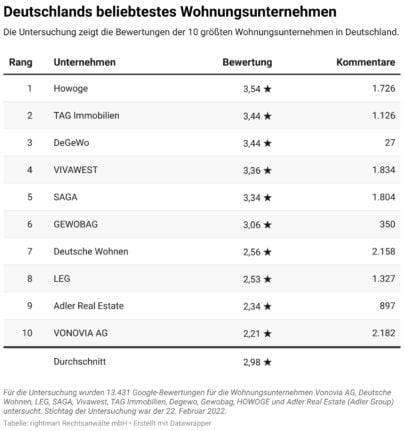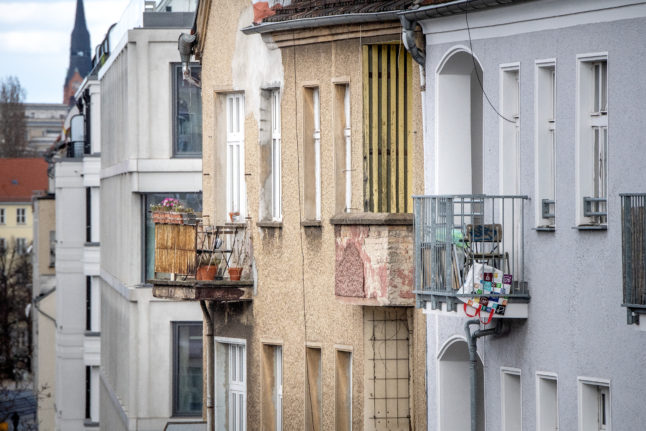It’s well known that the majority of people in Germany are tenants, and though there are number of small letting agents, the market is mostly dominated by a few large corporations.
You’ve probably heard names like Vonovia and Deutsche Wohnen crop up in headlines about the housing crisis, rent caps and campaigns for expropriation. You may have even rented from one or two of them.
What’s often overlooked is that the landlord you end up with can make a huge difference to your satisfaction as a tenant. But how do you know if you’re picking the right one?
This question was investigated by consumer rights firm Rightmart Rechtsanwälte, who conducted a survey of 13,500 Google reviews of the top 10 landlords in Germany.
Overall, the verdict wasn’t particularly positive, with the landlords averaging 2.8 out of 5 stars across all the reviews. But there were significant differences across the spectrum.
READ ALSO: OPINION: Germany’s rent crisis is fuelled by fear and foolish solutions
Vonovia is the ‘least popular landlord’
Housing conglomerate Vonovia, which describes itself as “Germany’s leading residential real estate company”, received the worst rating of any of the 10 landlords. Of around 2,180 reviews, the company received an average star rating of just 2.21 stars.
Having completed its acquisition of fellow major landlord Deutsche Wohnen last year, the company currently owns around two percent of Germany’s rental housing stock.
Berlin-based letting agent Adler Real Estate, which owns around 52,000 properties, came in second to last with an average of 2.34 stars on Google across 897 reviews.
LEG Immobilien Group also got a clear thumbs down from the reviewers, coming in third-last place in Rightmart’s study. Of a total of 1,326 ratings, the company received an average of 2.53 stars.
Somewhat surprisingly for anyone following the Expropriate Deutsche Wohnen & Co. campaign in Berlin (a campaign to bring the properties of major landlords into state hands), the most public target of the campaign came fourth-last in terms of tenant satisfaction. Coming just behind LEG, Deutsche Wohnen received an average star rating of 2.56 out of a total of 2,158 reviews.
READ ALSO: ‘Housing is a human right’: Rent activists step up pressure ahead of German elections

Hogowe comes out on top
On the other side of the spectrum, Hogowe – one of Berlin’s six municipal housing associations – was ranked highest among any of the landlords in terms of customer satisfaction.
The housing association, which says it wants to help create a “Berlin worth living in now and the future”, managed a highly respectable 3.54 stars across a total of 1,726 Google reviews.
Fellow state housing association DeGeWo came in joint second place alongside TAG Immobilien, with both companies receiving 3.44 stars on the back of 26 and 1,126 ratings respectively.
In third place is the housing company Vivawest, which rents out properties in western German states like North Rhine-Westphalia. With 1,834 ratings, the company comes in at 3.36 stars.
READ ALSO: How much deposit do I have to pay when renting in Germany?
It’s worth keeping in mind that the study focussed on large landlords. Smaller companies were left out of the ratings, but you may be able to search for other reviews left online if you want to see how your landlord or Hausverwaltung (property management) compares.
Tips for dealing with landlords
According to Jan Frederik Strasmann, managing partner of Rightmart Rechtsanwälte, the results of the survey show just how difficult it can be to navigate the tenant-landlord relationship successfully.
“The relationship between tenants and landlords can become very emotional, as in many cases it is about one’s own home and one’s private retreat,” he explained. “For this reason – and because Germany is a country of tenants – legislators have set very clear rules for most situations.”
Though heated disputes can still arise as a result of things like rent increases or service charges, Strasmann recommends keeping the following four tips in mind to ensure that a fair legal solution can be found:
-
Tenants should never let themselves be led by emotions when taking action, but should always keep a cool head
-
Contract amendments should never be signed hastily or under pressure, as these amendments will still be valid even if the tenant regrets agreeing to them at a later date
-
In the event of a dispute, communication should usually handled by a lawyer specialising in tenancy law, as untrained consumers can easily make mistakes that could have serious consequences
-
To be properly protected, it is advisable to take out a legal expenses insurance contract that also covers tenancy law or join a tenants’ association. That way tenants can have peace of mind in case disputes arise
READ ALSO: EXPLAINED: How to get a rent reduction for problems in your German flat
Useful vocabulary
housing companies – (die) Wohnungsunternehmen
landlord – (der) Vermieter
rating – (die) Bewertung
satisfied – zufrieden
most popular – beliebsten
in the case of a dispute – im Streitfall
hastily – voreilig
Have your say
Which landlords would you recommend to people looking to rent in Germany, and why? Let us know by emailing [email protected].




 Please whitelist us to continue reading.
Please whitelist us to continue reading.
Member comments